By John Helmer, the longest continuously serving foreign correspondent in Russia, and the only western journalist to direct his own bureau independent of single national or commercial ties. Helmer has also been a professor of political science, and an advisor to government heads in Greece, the United States, and Asia. He is the first and only member of a US presidential administration (Jimmy Carter) to establish himself in Russia. Originally published at Dances with Bears
Between August 9 and 12, 1941, taking their battleships in turn to meet in a Canadian bay, US President Franklin Roosevelt (centre, left) and British Prime Minister Winston Churchill (centre, right) discussed what to do about their adversaries at the time, Germany and Japan. Roosevelt had whispered, and Churchill later reporting him as saying aloud: “I will wage war, but not declare it.”
Until February 21, 2014, President Barack Obama’s (right) whispers were audible; President Vladimir Putin (left) didn’t believe what he was hearing. Now there is armed US war against Russia on the Ukraine and Syria-Turkey fronts; exchanges of armed signals in the Black and Baltic Seas; and an all-fronts war against Russian capital. For the US, no declaration; for Russia, no way back.
Putin said as much at last week’s St. Petersburg meetings: “People feel no danger and that is alarming for me. Why can’t we see that we are dragging the world into an utterly new dimension? This is the problem.” “I am not interested in laying blame now. I simply want to say that if this policy of unilateral actions continues and if steps in the international arena that are very sensitive to the international community are not coordinated then such consequences are inevitable.” By consequences, Putin meant war, undeclared by the US against Russia, compelling Russia to forestall in its defence. “If we continue to act according to this logic, escalating [tensions] and redoubling efforts to scare each other, then one day it will come to a cold war.”
Cold is not the kind of war Putin means. “I don’t know where it [the deployment of the U.S. missile defense system in Europe] might lead to but I know for sure that we will have to respond.”
For the precedents of undeclared US warmaking, provoking the Japanese attack on Pearl Harbour, and that as the intended backdoor to US war with Germany, it’s necessary to open, The Challenge of Grand Strategy. This is a little-known collection of essays by US historians of the period between World War I and World War II. Open it here.
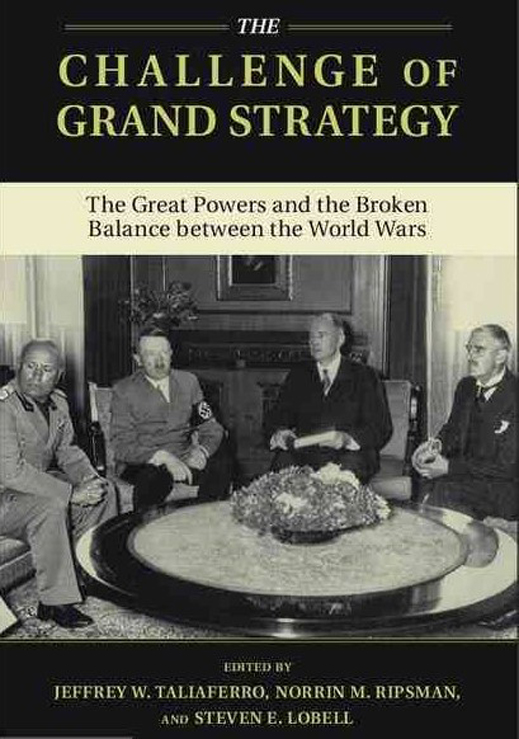
The nine American academics and one Japanese don’t present their research results to make pro-Soviet or pro-Russian points. They recognize Russian and German policy in the inter-war period as ideological; American exceptionalism isn’t the same thing, they write. Stalin, they regard as delusional and paranoid.
The research is presented instead as demonstrating, not how reluctant, appeasing, misguided, fanatical or uncompromising the Americans, British, Germans and Japanese were; but rather how deliberate, calculating, and reasonable each was in what they thought were their own best interests, facing the only choices they believed their own and their adversaries’ capabilities and intentions allowed.
In retrospect, the evidence proves Roosevelt planned US economic sanctions against Japan, first against trade in strategic minerals, then against Japan’s offshore cash and capital, and finally against the sale of oil, in order to provoke war in the Pacific. As Roosevelt is quoted as telling his Secretary of War in October 1941, seven weeks before the Pearl Harbour attack: “we face the delicate question of the diplomatic fencing to be done so as to be sure that Japan was put in the wrong and made the first bad move – overt move.”
“MAGIC”, concludes Jeffrey Tagliaferro about the US cracking of Japan’s most important coded communications from Tokyo and from Berlin, “confirmed the underlying suppositions of Roosevelt’s strategy since mid-1940, namely to wage an undeclared naval war on Germany in the north Atlantic in the expectation that Hitler would provoke a casus belli. If that failed [it did, Tagliaferro adds] – Roosevelt would use economic sanctions to provoke Japan into striking against US possessions in the Pacific, on the assumption that Hitler would enter a US-Japan war.”
Today, according to Russian sources, it is the conclusion of the Kremlin and General Staff that Obama and his would-be successor, Hillary Clinton, are following the Roosevelt line. Putin made the point last Friday when asked how differently he views the presidential candidacies in the US of Donald Trump and Clinton.
Trump, said, Putin, “is a vivid personality. Is he not? He is. I did not ascribe any other characteristics to him. However, what I definitely note and what I definitely welcome – and I see nothing wrong about this, just the opposite – is that Mr Trump said that he is ready for the full-scale restoration of Russian-US relations. What is wrong with that? We all welcome this! Don’t you?”
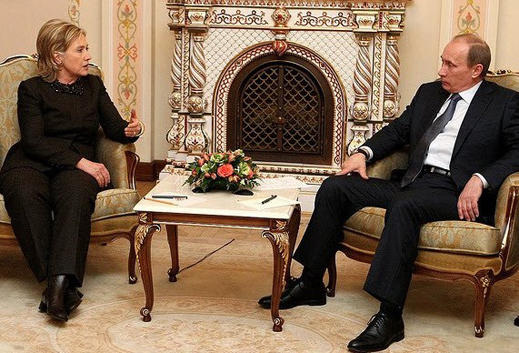
Clinton with Putin in Moscow, March 2010. According to Clinton, “he was hardly even listening.”
Source: http://www.thetimes.co.uk/tto/life/article4114685.ece
About Clinton, Putin said: “I did not work with her, [Foreign Minister Sergei] Lavrov did. Ask him. He is sitting here… I worked with Bill Clinton, although for a very short time, and we had a very good relationship. I can even say that I am grateful to him for certain moments as I was entering the big stage in politics. On several occasions, he showed signs of attention, respect for me personally, as well as for Russia. I remember this and I am grateful to him. About Ms Clinton. Perhaps she has her own view on the development of Russian-US relations.”
It was the objective of the St. Petersburg International Economic Forum (SPIEF) last week to warn Europeans not to over-estimate their own or US capabilities in fighting the current war with Russia; nor underestimate Russian capabilities and intentions to fight back. Record-breaking announcements from the SPIEF secretariat were planned to substantiate the fight-back on the business front. According to Tass, “332 formal agreements for around 1 trillion rubles ($15.44 billion) were signed, Adviser to the Russian President, Deputy Chairman of the Organizing Committee – Executive Secretary, Anton Kobyakov said on Friday at a press conference of the results of the forum.”
This compares with the reported SPIEF result in 2015 — 205 agreements for a total of Rb293.4 billion ($4.52 billion); and in 2014, 175 agreements for Rb401.4 billion ($11.5 billion). In 2013, the last pre-war SPIEF, 102 contracts were reportedly signed for a value estimated at Rb9.6 trillion ($294 billion).
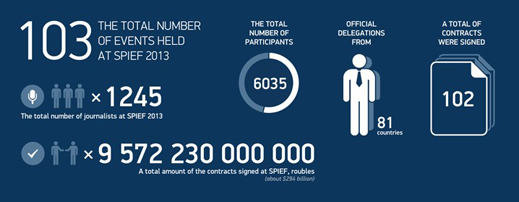
Financially, the 2013 result was the acme. This year, though, a record number of 12,000 participants attended; a record number of 130 countries were represented.
Russia, Putin told his session with foreign corporation chiefs, has the advantage of knowing the measure of its enemies’ capabilities, Europe and the US lack the measure of Russian intentions. Americans have capabilities, especially in economic warfare, Putin conceded. But the price is being paid in Europe, which cannot sustain the losses as hardily as Russia can, and lacks Russia’s military options. “The world needs a powerful country like the United States, and we also need it,” Putin told the table on Friday.
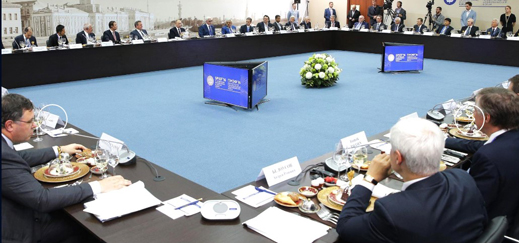
Source: http://en.kremlin.ru/events/president/news/52182/photos/44718
“But we do not need it to continuously interfere in our affairs, telling us how to live, and preventing Europe from building a relationship with us. How are the sanctions that you have mentioned affecting the United States? In no way whatsoever. It could not care less about these sanctions because the consequences of our actions in response have no impact on it. They impact Europe but not the United States. Zero effect. However, the Americans are telling their partners: ‘Be patient.’ Why should they? I do not understand. If they want to, let them.”
Some European businessmen in St. Petersburg speak sceptically of the capabilities of Russian businessmen to sustain war; a few are scornful. According to an international banker, “the well-known oligarchs of the first rank — we know they want to be too much like us, live in our palaces. They like our life better than the one at home. For them, this war is turning them from paragons into pariahs. They don’t like it. They indulge in wishful thinking. But politically they are impotent. [Gennady] Timchenko, [Yury] Kovalchuk, and the Rotenbergs [Boris and Arkady], whom the Americans have hit with the crony sanctions, were never going to make it in the west, so sanctions against them will also have no political effect. [Former finance minister Alexei] Kudrin stands for capitulation. He stands alone. There’s no lobby in Moscow for peace on US terms.”
City of London bankers add they don’t believe the leaders of Russia’s state banks and state-controlled corporations are better capable of warfighting than the oligarch-owned and market listed companies. For evidence the sources point to the failure of the Russian Finance Ministry and the state banks in the issue of the state’s Eurobond in the last week of May.
A first attempt at issuing the bond in February had been postponed after the US Government persuaded US banks not to underwrite or subscribe. Then Finance Minister, Anton Siluanov (below, left), announced that “Russia will raise $3 billion in single tranche, regardless of the position of the US banks.”
Siluanov also authorized the bond prospectus to undertake that none of the proceeds would help in the financing of sanctioned individuals or companies; this was despite the fact that the underwriter and issuer of the prospectus, the state bank VTB, was on the sanctions list.
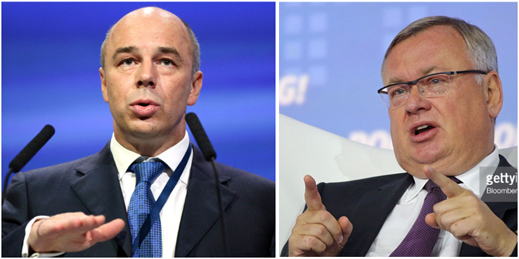
The attempt by VTB, headed by Andrei Kostin (above, right), reportedly had attracted between $5.5 billion and $7 billion in offers by the close of bidding on May 23. The next day, however, according to the Finance Ministry announcement, the bank and the ministry were only able to sign buyers for $1.75 billion. “More than 70% of the bond was purchased by foreign investors”, Siluanov announced to the press. “This is the group we focused on. We are satisfied with the placement.”
Spokesman for Siluanov and Kostin refuse to provide a copy of the prospectus; identify the officials they delegated to manage the bond issue; or substantiate Siluanov’s claim. US officials leaked to business reporters in New York and London that the bond had failed to achieve its foreign target because the two bond market trading organizations, Euroclear and Clearstream, had refused to participate. The Wall Street Journal called the issue “so-called Eurobonds”, adding market comment that traders were “not aware of any major foreign investors who have participated due to the concerns over the settlement of the bonds.”
A veteran bond market source in London says Euroclear and Clearstream did not refuse to accept the bonds. “They simply delayed replying to VTB’s application. That meant there was no security number assigned to the bond, confirming it could be traded among their members. If you can’t trade, you can’t buy. So the majority of those who applied to buy the bonds withdrew when they realized what Euroclear and Clearstream were up to. The big success in the bidding stage was a big failure at the settlement stage.”
Euroclear is owned by J.P. Morgan, while Clearstream is owned and operated by the Deutsche Borse, run by an American, Jeffrey Tessler (right). Neither organization responds to questions about the Russian bond issue. The source adds: “There was serious negligence at the Finance Ministry and VTB in Moscow. They should have checked and obtained the trading guarantees in advance. Instead, they had to say in the prospectus they were still negotiating, but had received ‘no assurance’ of compliance from Euroclear and Clearstream. Also, it’s obvious in retrospect that the London advisors to MinFin on the bond failed to anticipate the clearance problem. Who was deceived by this? Maybe Putin.”
Market sources say Siluanov and Kostin were forced into arranging offshore buyers to disguise what they had failed to anticipate, and what had happened. “Nothing could be a clearer illustration of how the US is waging its war, and how the Russians, on the civilian side, are incapable of fighting back. The Russians say they are applying the rules of the market. They use the words. They don’t seem to appreciate that the US is waging a well-co ordinated, command war.”
“We remember how it all started,” Putin said last week at SPIEF. “Russia did not initiate the current breakdown, disruption, problems and sanctions. All our actions have been exclusively reciprocal. But we don’t hold a grudge, as they say, and are ready to meet our European partners halfway. However, this can by no means be a one-way street.”


The USA Russia relationship is a clear case of “follow the money”.
With the formation of the USSR it got a cold shoulder at best because socialism offended Wall Street to the core.
Then it was disbanded and Yeltsin was seen as a paragon of (robber baron) capitalism.
Now that Putin has reined in the oligarchs etc, its back to cold war mentality as said oligarchs were the extended arm of Wall Street in Russia.
While some of us have pooh poohed the Deep State idea in the past, this financial war against Russia is clearly one area where command and coordination doesn’t seem to be a problem. And the FDR/Japan analogy should be taken seriously. Just as Roosevelt’s behind the scenes moves had to be concealed from a substantially antiwar American public the current situation with Russia is being heavily propagandized with enthusiastic support from all the major news outlets. It’s doubtful that most of the public have a clue about this deliberate USG effort to rekindle the cold war.
Where the comparison breaks down is that Roosevelt was acting out of the entirely rational motive of saving Europe from Hitler whereas the current toying with nuclear armed Russia is completely insane. This is why some of us seem to be obsessed with stopping HRC. You don’t put lunatics in charge of the asylum. Trump’s offer to come to terms with Russia is the wisest thing he has said–and the most attacked.
Unlike politicians and policy wonks, billionaire businessmen own real assets that would be at risk in any war. Especially in real estate, these assets are considered like children that have been nurtured and developed. Trump certainly wouldn’t want WWIII, not only for the general overall economic destruction, but also for the possibility that a landmarked property could be destroyed. The Clintons, on the other hand, have never built anything; they have no skin in the game.
Real estate losses? How about the whole friggin’ball of wax? Everything, including you and yours, me and mine and all complex life on Earth.
I’d say Roosevelt’s rational motive had the goal of making America the dominant power. Save a British Empire desperate for help, while destroy two hostile empires in Germany and Japan. End result: America replaces the British Empire.
You’re absolutely correct on the nuclear issue. This should be the only thing that matters. It was all that mattered during the Cuban Crisis, which is why nuclear war was avoided. Today there isn’t even awareness of a crisis. Thus we are now closer to nuclear obliteration than anytime in history.
It would be interesting to understand the degree to which the Soviet population was aware of the Cuban Missile Crisis.
As Pat Lang over at Sic Semper Tyrannis puts it, the US is now a “muffled zone” where the public narratives are carefully managed to disseminate a framing of elite intents designed to validate future action.
I can’t imagine the Soviet population were as deeply ignorant of the nuclear threat as the US population is now, but I was but a mere tot then, perhaps they were.
The competing gas pipeline wars. see Ukraine and Syria. Also see Iraq and Afghanistan.
Flora – Glad you referenced energy or prior bad energy policy as a cause for these geopolitical tensions and wars. Whether it is labor, currency as energy or nowadays also raw resources is it the issue that drives almost everything else.
Empircal ambition leading to corruption blinds energy policy. Europe is subservient to the US because of the EU being created and led by currency. While this is a critical component, the first matter is politicial structure to formulate a good energy policy. Without it, the Russians raised the cost of energy. Now, they overplayed there hand a bit but now seem willing to negotiate.
Even so, more energy independent policy must occur. Despite the finance empire and bankster games, this happened to a good degree this last 15 years in the US but not Europe.
Why the US can now push Saudi Arabia around to cut the crap. The EU requires political foundation (you do need the populations consent in the end)) that is lacking that may be able to be fixed. Time will tell but I am not opptomistic. That is because pain tends to be a general catalysts of evolution and those at the top feel it onky at the end when it tends to be too late.
I think shitting on Sochi Olympics which is a symbol of national pride was a big mistake and was a lost opportunity to conduct a lot of back door negotiations. Boxing the bear into a no win is insane. It is Geronimo but with the bomb. Stupid and hubristic.
Several decades ago USAF Col. John Boyd (1927-1997) set forth some criteria according to which a state’s grand strategy might be evaluated. Boyd was continually modifying and updating his ideas and thus his thinking in this area is a moving target. This is how they make sense to me:
My question is this: Has United States’ foreign policy since the collapse of the Soviet Union been intentionally formulated to violate each and every one of Boyd’s criteria?
Simply put, yes.
The reification of “the market” within the hegemon’s political establishment was supposed to have made all that obsolete.
So long as everyone subjected themselves to the dictates of the universal and benevolent self equilibrating market, everything would get better for everyone.
Our foreign policy now is to impose this simple universal truth on a recalcitrant world even as we eliminate those sectors of our own population who are incompetent to glean the rewards this glorious market vision promises to all who have “merit”.
They (the Borgist elite) really do believe their own propaganda. Plus they’re not co-incidentally getting massively rich off the deal.
ex-pfc lists these two John Boyd rules.
1) * Strengthen national resolve and increase the nation’s internal political solidarity.
2)* Weaken the resolve of the nation’s adversaries and reduce their internal cohesion.
Let.s compare Russia and the US. US actions have definitely strengthened Russia’s national national resolve and increased political solidarity. Putin’s favorable ratings jumped from 65% to 85% since the US backed coup in Ukraine. Definite plus for Russia on part 1 and US fail on part 2. Obama’s support lingers in the 40 to 50% range. Definite US fail on part 1 probable Russian neutral on part 2.
Does the US really want to enter a shooting war with Russia when they are united and we are divided?
The logic of empire rolls on.
https://therulingclassobserver.wordpress.com/2016/06/15/ruling-class-axioms/
Why does a country the size of Russia need to borrow money? In what currency are they borrowing it? What do they need to buy with it that they could not produce themselves? Are they in essence paying for the needless privilege of not running their own printing presses?
It sounds to me like Russia could use a good dose of MMT. They seem to be hung up on neoliberal conceptions of finance.
Apart from weapons, Russian industry in pretty underdeveloped, they do have a use for foreign goods. They can survive without many imports but it would hurt. Printing money solves the issues with demand, but Russia already has low unemployment.
Did anyone else catch Joe Biden on Charly Rose last night? He continuously referred to military action, not diplomacy as the preferred solution to conflicts. He was well-informed and rational, but the stench of exceptionalism was repulsive. He expressed caution about confronting Russia on the battlefield, but viewed Russia’s annexation of Crimea to be a land grab that threatened Europe, requiring sanctions. It is clear to me that while the U.S. elite may be cautious about direct armed conflict with Russia, they have little compulsion against poking the bear.
It is ironic that foreign policy, where Clinton has a clear advantage of experience, is seen here as Trump’s strong suit. But Biden and Clinton are so consumed with exceptionalism and the quest for ever more power, that a future under their guidance seems frightening. Hell, with 50 seasoned diplomats petitioning the president to up the ante in Syria, it appears that a large segment of the U.S. foreign policy apparatus is insane.
“… viewed Russia’s annexation of Crimea to be a land grab that threatened Europe, requiring sanctions…”
When German intelligence and the USAF decided to hive off a chunk of Serbia, that was totally OK of course.
This is the tragedy of Trump: Hillary wants to be–to exploit the recent phrase of the German foreign minister–“warmonger-in-chief.” Her wars in Libya and Syria have only whetted the appetites of her henchpersons. By comparison, Trump is just an irresponsible, blithering nincompoop. Honest to God, I can imagine him as the safer alternative.
That is a possibility, but history tells me that once you get into that Oval Office echo chamber, and your get all the briefings, and it’s your manhood as these clucks define it on the line (and Trump is very susceptible to that kind of manipulation and pressure) you cave to the dominant ideology. Every president since Cleveland rejected annexation of Hawaii and war with Spain has swung to Exceptionalism and Interventionism. Every one.
Trump doesn’t know a hell of a lot about the world. When they take him aside and say, “Listen, Climate Change–it’s real–we’re looking at food, water, and energy shortages, mass migrations, and failed states in the very near future. The only way for us to ride out this catastrophe is to dominate the sources of key inputs and keep Russia and China’s mitts off them” you bet he’ll buy into it. This is the US elite’s last chance, as they see it, to hijack the life raft before the ship goes down. Clinton knows this scenario and is all on board. Trump hasn’t yet been filled in but I would wager anything that once he is, he’ll been just as supportive of the project as Clinton.
Trump is not stupid or easily managed. Obama has been relatively measured in his use of aggression, so a lot does depend on who the president is.
Obama kept Nuland and Co. on a leash in Syria, making them settle for using Qatar funded proxies. Whatever his faults with Guantanamo and drone strikes, he did keep the US from yet another massive aerial bombing of civilians. So yes, measured. He may have felt like he got suckered on Libya.
This.
Every president since Cleveland rejected annexation of Hawaii and war with Spain has swung to Exceptionalism and Interventionism.
Am I mistaken to think JFK might be an exception?
Laos, Bay of Pigs. Created the Green Berets over the objections of the Army staff. Raised the number of “advisers” in Viet Nam to 16,000. “Pay any price, bear any burden” sounds awfully Exceptionalist to me.
Handled the Cuban Missile Crisis much better than any of his advisers would have but still instituted an illegal blockade of a country he wasn’t at war with without a declaration of war. So, better than average (like Jimmy Carter) but consider the average!
the brain behind the US is the (((tribe))).
The tribe only cares about Israel. The only countries they figure can stand up to them is Russia+Iran. So they are going for a pre-emptive strike because any one who can fight them must be taken out. This is paranoia.
Question the tribe’s sponsored policies and they will go after your livelihood.
Sorry, i dont see this ending any way except anti-semitism all over again. Question is how much blood is spilled before the Blaster figures it out and dethrones the Master.
Interesting read. The actual wargamers are in a bind since there’s no military solution. A foreign power can’t project and supply conventional force deep into eastern Europe, and in any event there is a lot of uncertainty about how contemporary weapons systems would hold up under sustained opposition since they’ve never been tested against a foe of sophisticated technology and resources.
So it makes one wonder whether the neocons know they’ll back down in the areas where Russia, China, and Iran make stands (which seems to be the case so far), or if they’ll pursue more active destabilization one of these times and send us off the edge into the unknown.
There is a huge cloud of cognitive dissonance enveloping the West. I was raised in the first Cold War and watched “The Day After” on ABC in 1983. Intellectually, I recognize that the Cold War 2.0 has restarted. During the day, I rationalize that the elite wouldn’t be so stupid-crazy i.e. the WP article “NATO and the E.U. desert Georgia” from last week. But, at night or tired, fear floods me when I acknowledge that the State Department 51 will get their no fly zone in Syria and World War III with Russia if Hillary Clinton is elected President.
http://www.zerohedge.com/news/2016-06-19/us-sleepwalking-towards-nuclear-confrontation
Benedict@Large. I liked his comment about MMT. Can someone more
knowledge then me exlpo
re this MMT thing and would it work.
Newfoundland, the site of the Roosevelt-Churcill meeting, did not become part of Canada until 1949
And so we learn that even war can be waged passive-aggressively. Perhaps HRC is the perfect candidate after all?
Me thinks that having “won” the Cold War, Western leaders ache for a taste of what it might have missed. We should be careful of what we ask for.
Putin’s trump card – just one single emp blast launched from the gulf and it is game – set – match. Just imagine no power, food, comm, cars for a very long time if ever. Playing with fire…and we are history
Pure Chomskyite “America as Satan” doublespeak.
Pointedly ignores Putin’s invasions and seizures of territory from Moldova (Transdniester), Georgia (S. Ossetia and Abkhazia) and Ukraine (Crimea and Donbas), just it pointedly ignores Japan’s invasions of Manchuria, Korea and China (and further plans to conquer all of S.E. Asia) prior to the U.S. (i.e., Roosevelt and Obama) taking actions to restrain their aggression.
I don’t know if the author is a Kremlin fellow traveler or simply an appeaser by constitution, but he certainly has struck a chord with the commenters here. As a progressive myself, I am continually amazed at the support Putin’s rightist, klepto-fascist regime gets from Western leftists.